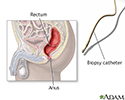Anoscopy and high-resolution anoscopy
Anal fissures - anoscopy; Anal polyps - anoscopy; Foreign object in the anus - anoscopy; Hemorrhoids - anoscopy; Anal warts - anoscopy; Anal cancer - anoscopy
Anoscopy is a method to look at the:
- Anus
- Anal canal
- Lower rectum
How the Test is Performed
The procedure is usually done in a health care provider's office.
A digital anorectal examination (DARE) is done first. Then, a lubricated instrument called an anoscope is placed a few inches or centimeters into the rectum. You will feel some discomfort when this is done.
The anoscope has a light on the end, so your health care provider can see the entire area. High-resolution anoscopy (HRA) uses an additional magnifying device called a colposcope. This device allows for a closer examination of the tissues to detect small changes. HRA may be used to help detect abnormal cells in your anal lining.
A sample for biopsy can be taken, if needed.
How to Prepare for the Test
Often, there is no preparation needed. Or, you may receive a laxative, enema, or other preparation to empty your bowel. You should empty your bladder before the procedure. Your provider may suggest that you avoid anal penetration and anal medicines or products before the procedure.
How the Test will Feel
There will be some discomfort during the procedure. You may feel the need to have a bowel movement. You may feel a pinch when a biopsy is taken.
You can usually return to normal activities after the procedure.
Why the Test is Performed
This test may be used to determine whether you have:
- Anal fissures (small split or tear in the lining of the anus)
- Anal polyps (growth on the lining of the anus)
- Foreign object in the anus
- Hemorrhoids (swollen veins in the anus)
- Infection
- Inflammation
- Tumors
- Abnormal growth of cells (dysplasia)
- Anal cancer
Anoscopy and HRA may also be used as a yearly screening test for anal cancer in people with HIV.
Normal Results
The anal canal appears normal in size, color, and tone. There is no sign of:
- Bleeding
- Polyps
- Hemorrhoids
- Other abnormal tissue
What Abnormal Results Mean
Abnormal results may include:
- Abscess (collection of pus in the anus)
- Fissures
- Foreign object in the anus
- Hemorrhoids
- Infection
- Inflammation
- Polyps (non-cancerous or cancerous)
- Tumors or dysplasia
Risks
There are few risks. If a biopsy is needed, there is a slight risk for bleeding and mild pain.
References
Beard JM, Osborn J. Common office procedures. In: Rakel RE, Rakel DP, eds. Textbook of Family Medicine. 9th ed. Philadelphia, PA: Elsevier; 2016:chap 28.
Clinicalinfo.hiv.gov website. Guidelines for the Prevention and Treatment of Opportunistic Infections in Adults and Adolescents With HIV. clinicalinfo.hiv.gov/en/guidelines/hiv-clinical-guidelines-adult-and-adolescent-opportunistic-infections/human?view=full. Updated July 9, 2024. Accessed August 2, 2024.
Downs JM, Kulow B. Anal diseases. In: Feldman M, Friedman LS, Brandt LJ, eds. Sleisenger and Fordtran's Gastrointestinal and Liver Disease. 11th ed. Philadelphia, PA: Elsevier; 2021:chap 129.
Reynolds PL, Wilkins T. Anoscopy. In: Fowler GC, ed. Pfenninger and Fowler's Procedures for Primary Care. 4th ed. Philadelphia, PA: Elsevier; 2020:chap 83.
Review Date: 8/22/2022
Reviewed By: Debra G. Wechter, MD, FACS, General Surgery Practice Specializing in Breast Cancer, Virginia Mason Medical Center, Seattle, WA. Also reviewed by David C. Dugdale, MD, Medical Director, Brenda Conaway, Editorial Director, and the A.D.A.M. Editorial team. Editorial update 08/15/2024.








